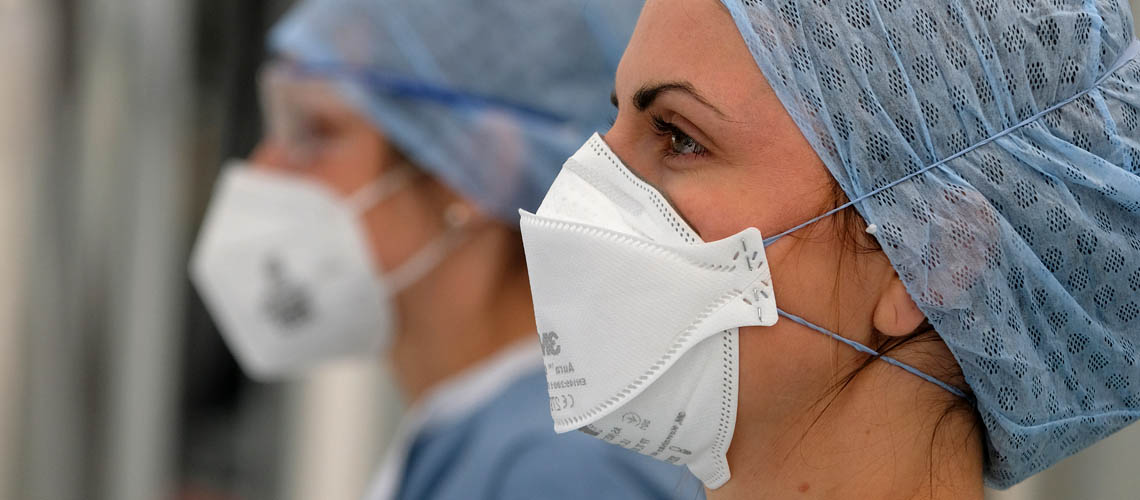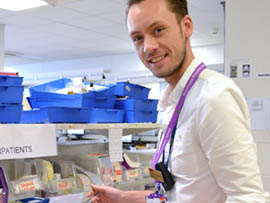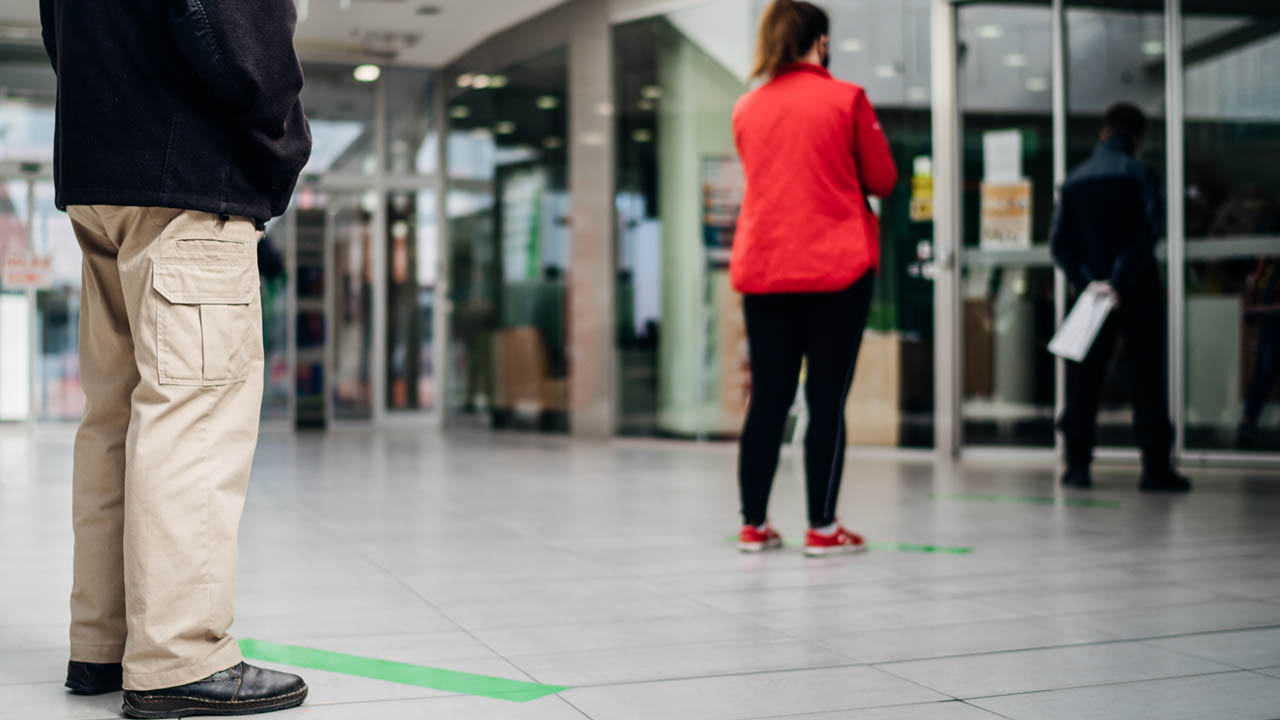Manchester pharmacists join the frontline in COVID-19 fight
According to NHS England, around 15,000 ex-NHS staff have returned to work since the coronavirus pandemic hit the UK earlier this year, with that number expected to keep growing.

Within the Faculty of Biology, Medicine and Health, our academics are helping the fight against COVID-19 in a number of ways, with some of our staff temporarily re-joining the NHS.
This is the case in our pharmacy team, with support coming from academics in both community and clinical settings. The role of pharmacists can’t be underestimated, especially in such unprecedented times where medicines, drugs and prescriptions have perhaps never been more in demand.

Andrew Mawdsley
Andrew is a clinical senior lecturer on the MPharm course.
Returning to clinical pharmacy
One member of the pharmacy team answering the call is Andrew Mawdsley, a clinical senior lecturer on our MPharm course.
“I chose to return to clinical practice as I just knew the NHS is where I need to be now,” Andrew explained.
“As soon as the scale of the situation became apparent, I felt it was my responsibility as someone with relevant skills to use those skills in a productive way.”
“I have seen so many colleagues; pharmacists, nurses, doctors and other healthcare professionals, returning to practice or moving from their usual speciality area without hesitation, despite the risks to themselves.”
A clinical pharmacist’s role in battling COVID-19
Andrew has thrown himself straight in to the deep end, covering COVID-19 wards within the Manchester University NHS Foundation Trust.
While most people would assume that it’s solely nurses and doctors who are involved in the care of patients on these wards, hospital pharmacists have a huge part to play.
“My role is to work as part of a multidisciplinary team supporting clinicians with their prescribing best practice and providing clinical pharmaceutical care,” Andrew explained.
“Many staff are working in ways that they haven’t done so before, so our expert support is even more critical in the current situation, to make sure patients are getting the best care and the right medication at the right time.”
“Our COVID patients are treated with oxygen support, as well as antibiotics to treat any secondary bacterial infections that they are vulnerable to due to the damage the virus is doing to their lungs.”
“Many of these patients also have other underlying health conditions, so we need to ensure they receive the right medication for these conditions too.”

Clinical trials
In the search for a resolution to COVID-19, clinical trials are being offered to a number of patients who are suffering with the virus.
As a clinical pharmacist with years of experience, Andrew can offer a bit of an insight into the drugs involved with these trials.
“There are specialist clinical trials pharmacists in the hospital who are working on the ongoing trials with drugs that are currently used for other conditions,” Andrew explained.
“These include lopinavir-ritonavir, a drug commonly used to treat HIV, and hydroxychloroquine, a treatment for malaria. It is hoped that these drugs will be effective in the battle against coronavirus.”
Although Andrew admits that the hospital feels ‘very strange’ and ‘different to normal’ at the moment, he wouldn’t be anywhere else. Years of training have prepared him for this, and he’ll continue to play his part in the fight against coronavirus, alongside some of his current and former students, for the foreseeable future.

Sadia Qayyum
Sadia is a lecturer in pharmacy practice and teaches on our undergraduate pharmacy MPharm degree.
Community pharmacy
It isn’t just in hospitals where pharmacists have been working relentlessly during this pandemic; something that won’t come as a shock to anyone who has visited their local pharmacy in the past couple of months.
Sadia Qayyum, a University of Manchester graduate and current lecturer in pharmacy, has been working in the community since the outbreak began.
“During the current pandemic I have been working on the frontline to help manage the requests and queries from patients in both GP practices and community pharmacy,” Sadia explained.
“As a profession, pharmacy has never been so crucial to the seamless delivery of medication and accessible advice when our healthcare resources are stretched towards capacity.”
“Pharmacists have been working with doctors and patients to ensure medications are received in a timely manner despite the obvious practical issues in delivering this due to the quarantine restrictions and social distancing in place.”
Coping with the initial panic
It doesn’t seem too long ago that supermarket shelves were stripped bare of essentials and paracetamol was in short supply, with stockpiling becoming a potentially very serious issue.
The effects of this panic were felt heavily in both community pharmacies and GP practices, as Sadia explains.
“GP practices have been inundated with patient prescription requests; some that were appropriate, but also a vast number of requests for medication to be issued early. There were demands for three months of medication due to ‘the situation’, as well as requests for medication that people had heard – or read on Google – were good treatments for the coronavirus.”
“Taking the time to discuss the issues our patients are suffering from is often invaluable from their perspective and can help reassure them during these exceptional times.”
“I honestly have never in my career seen anything like the sheer volume of prescriptions as well as requests for paracetamol, alcohol hand gel and latex gloves. But after an initial surge, where a lot of pharmacies ran out of the basics, supply issues now seem to have been resolved and these items are largely back in stock.”

Social distancing
One obstacle that community pharmacies have encountered is complying with social distancing rules set out by the government. Most pharmacies operate in relatively small spaces and the demand for services is at an all-time high. Negotiating these rules has involved patience, creativity and hard work.
“Queues for patients trying to get into the pharmacy continue to be lengthy, with limits placed on the number of people allowed in branches at any one time,” Sadia explained.
“Most patients have shown some patience, although some have expressed their dissatisfaction to the pharmacy team about various issues that have bothered them. In some cases the abuse has been so bad that the police have been called.”
“The pharmacy I work for is open for over ten hours a day; the workload is relentless, and the phone just doesn’t stop ringing! With the high levels of concentration needed to avoid errors, the stress levels are high.”
Despite all the challenges, pharmacists will continue to play a unique role in delivering healthcare to patients and supporting all areas of the NHS.
With COVID-19 continuing to put a halt on life as we know it, Sadia and Andrew are both incredibly proud that they are able to use their skills to contribute in the battle against it.
Find out more about studying pharmacy at The University of Manchester.
